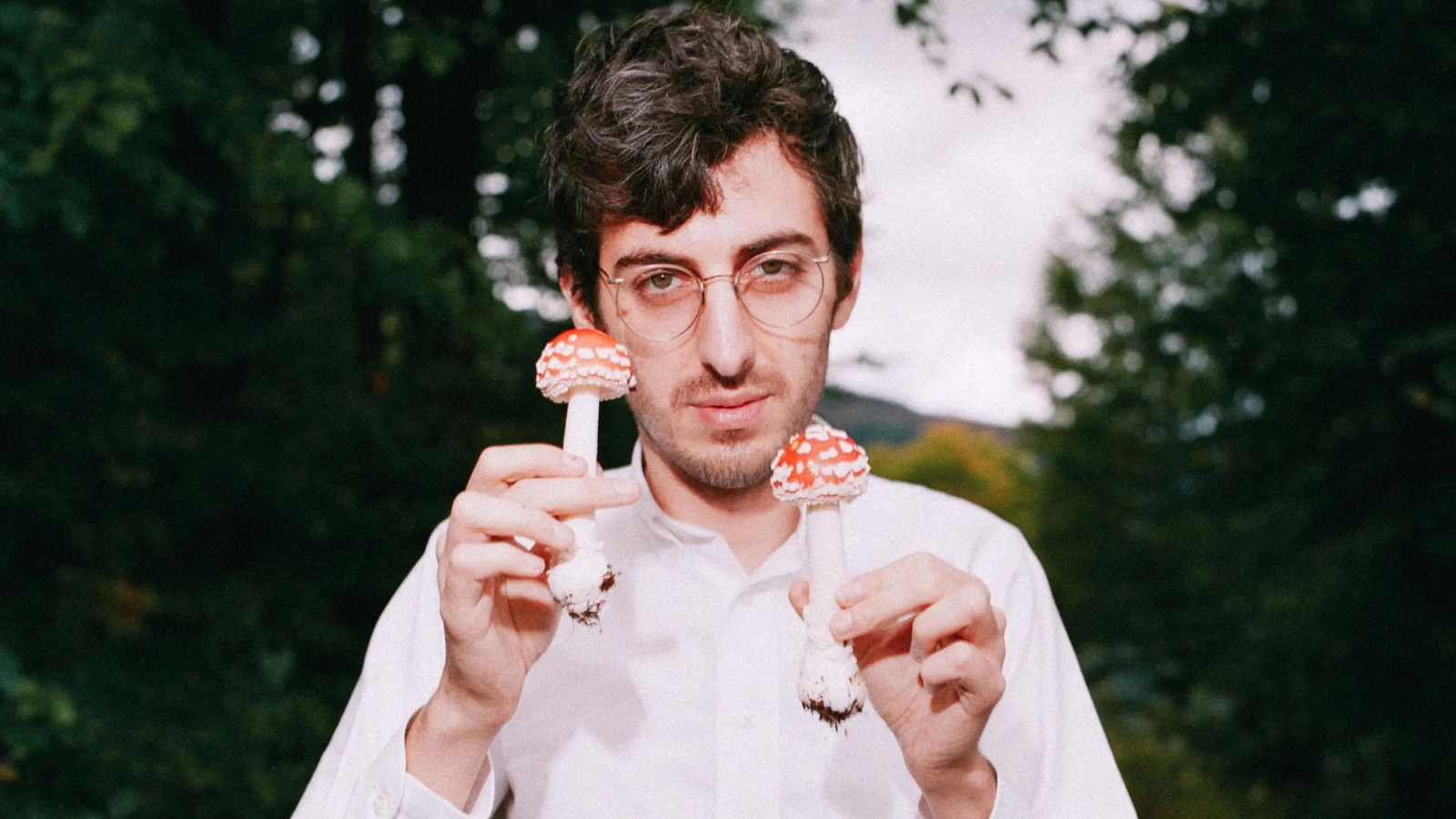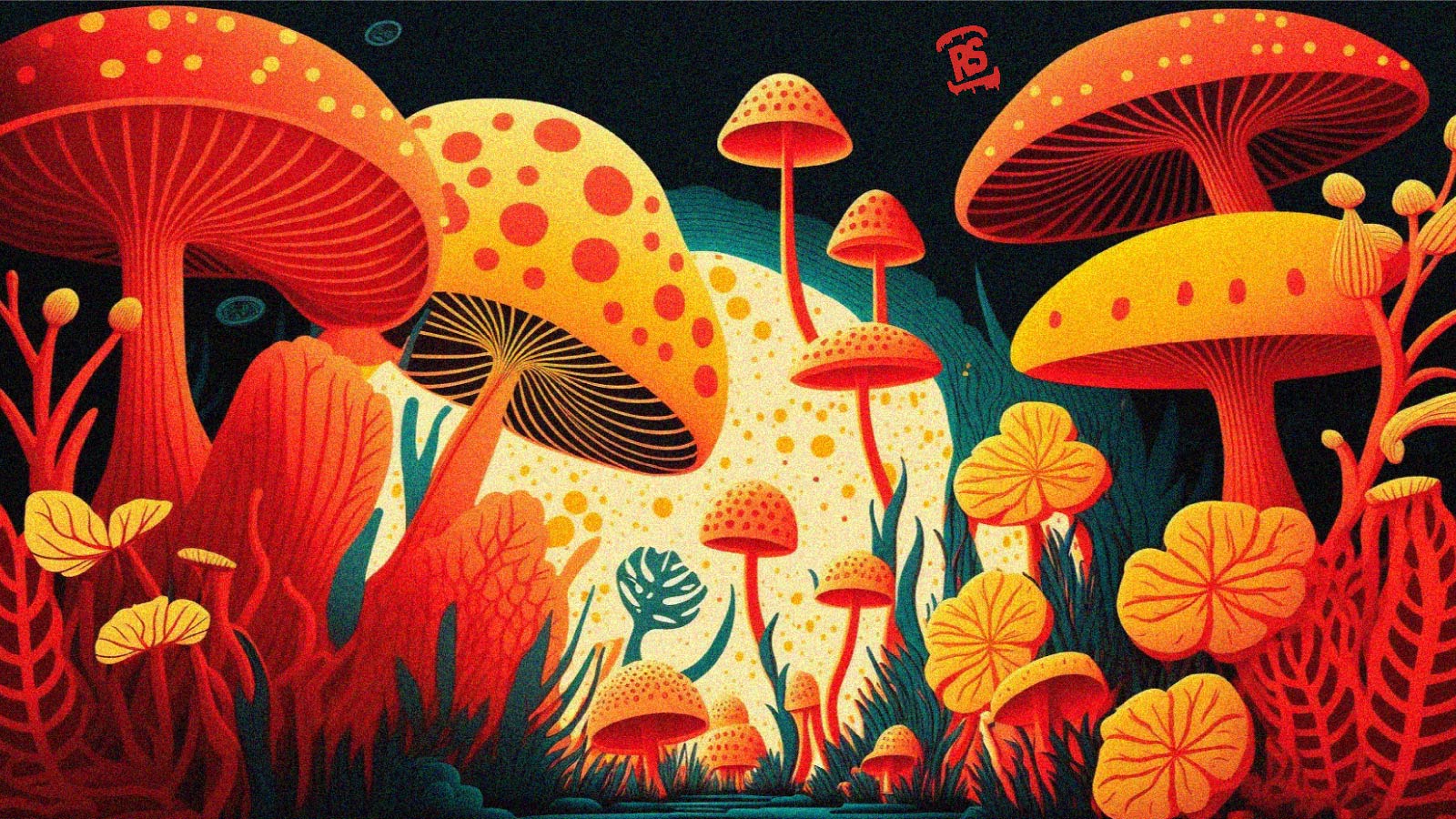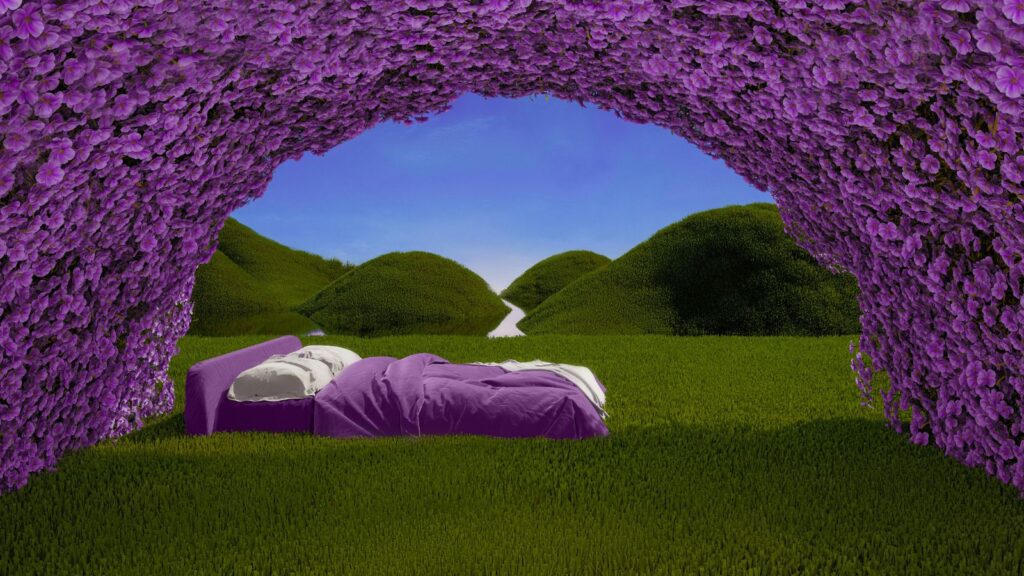On a warm spring day, March 28, 2023, I found myself once again making the trek to the city of Angels. As part of the Reality Sandwich editorial team, it is my mission to always be at the forefront of psychedelic culture, whether that means ingesting psychedelic substances (for the science of course) or taking part in bizarre rituals foreign to most readers. This event would be a little milder than a shamanic ceremony in the amazon; however, I traveled up to a private residence deep in the Hollywood hills to take part in a screening of psychedelic documentarian Hamilton Morris’ show.
Co-Hosted by The Psychedelic Network, the VICE TV series Hamilton’s Pharmacopeia, Episode: “Ultra LSD” would be followed by a psychedelic enthusiast potluck mixer. Mushroom goodness awaits. The following highlights my experience at this event and a dive into one of plant medicines’ most humble advocates and provocateurs.

Who is Hamilton Morris?
Hamilton Morris was born on April 14, 1987, in New York City. He is the son of renowned American artist and documentary filmmaker Errol Morris and art historian Julia Sheehan. Hamilton attended the University of Chicago, where he studied anthropology and chemistry. His unique background and interests laid the foundation for his career as a science journalist, documentary filmmaker, and researcher.
Morris began his career as a science writer, contributing to various publications including VICE Magazine, Harper’s Magazine, and The Dose. His writing focuses on the use and culture of psychoactive substances around the world. In 2010, Morris started working on his groundbreaking documentary series Hamilton’s Pharmacopeia for VICE.
Hamilton’s Pharmacopeia
Hamilton’s Pharmacopeia is a documentary series that showcases Morris’s exploration of the chemistry, history, and culture surrounding psychoactive substances. The show debuted on VICE in 2016 and has since gained a substantial following. Each episode takes viewers on a fascinating journey, diving deep into the world of mind-altering substances and the people who use them.
Throughout the series, Hamilton investigates a wide variety of psychoactive substances, from well-known drugs like LSD and MDMA to lesser-known and obscure substances such as Quaaludes and Salvia divinorum. The show is known for its in-depth examination of these drugs, their cultural significance, and the scientific processes involved in their creation.
In addition to exploring the chemistry and effects of these substances, Hamilton’s Pharmacopeia also delves into the legal and social issues surrounding their use. The show has featured interviews with prominent figures in the world of psychedelics, such as the late chemist Alexander Shulgin and the founder of the Multidisciplinary Association for Psychedelic Studies (MAPS), Rick Doblin.
Ultra LSD
Before the screening of the episode, the guest and I were treated to a few minutes of stand-up comedy from psychedelic-minded comedian Adam Strauss. Strauss admits to being healed of his severe OCD thanks to the power of mushrooms. Adam got the crowd in a very laughable and excited mood, comparing the vibes of people and hippies from the bay area to LA, the passing of time on drugs, and other jokes poking fun at the psychedelic community.
After the bit, the attendees of the event all gathered for an episode of Hamilton’s Pharmacopeia: “Ultra LSD.” In this episode, Hamilton explored the current research behind LSD, as well as chatting with Beckley Foundation founder Amanda Feilding.
Amanda’s unconventional methods of research into the unorthodox practice of trepanation as well as the spirituality of LSD led her down the path toward founding the Beckley Foundation to continue her research.
Morris also was able to chat with researchers studying the effects of LSD and the history of its manufacturing, and how the substance derived from ergot evolved.

The Rise of Plant Medicine and the Importance of Documenting These Drugs
As the use of plant medicine gains traction, it becomes increasingly important to document the history and culture surrounding these substances. Morris’s work is an invaluable resource in this regard, providing a detailed and nuanced perspective on these complex topics. By capturing the stories, rituals, and scientific aspects of these substances, Hamilton’s Pharmacopeia contributes to a more comprehensive understanding of plant medicine and its potential benefits.
Where to Follow Hamilton Morris’s Work
For those interested in following Morris and his work, there are several platforms where you can find his content:
VICE TV: Hamilton’s Pharmacopeia is available on VICE TV, where you can watch all episodes of the series.
YouTube: Hamilton Morris’s official YouTube channel features clips and full episodes of Hamilton’s Pharmacopeia, along with interviews and other content.
Social Media: Morris is active on social media platforms, including Twitter (@HamiltonMorris) and Instagram (@hamiltonmorris), where he shares updates about his work and insights into the world of psychoactive substances.
Morris is making a significant contribution to our understanding of these powerful and often misunderstood substances. His dedication to providing a comprehensive, scientific, and empathetic perspective on drug use and culture helps break down stigmas and paves the way for a more informed and open-minded approach to the topic.
Changing Perceptions and Encouraging Research
Morris’s documentaries and articles have played an essential role in the psychedelic renaissance, a modern movement that seeks to re-evaluate the role of psychedelics in society and explore their potential therapeutic applications. By presenting well-researched, unbiased, and accessible information about psychoactive substances, Morris helps to counteract the stigma and misinformation that has historically surrounded these drugs.
His work has encouraged scientific research into the therapeutic potential of psychedelics and contributed to the growing public interest in this field. This shift in perception has led to increased funding for research and a more open-minded approach to psychedelic-assisted therapies, which show promise in treating mental health conditions such as depression, anxiety, and post-traumatic stress disorder (PTSD).
Advocating for Responsible Use and Harm Reduction
Morris is also a strong advocate for responsible drug use and harm reduction. Through his work, he educates people about the importance of understanding the substances they are using, their effects, and potential risks. By emphasizing the importance of set and setting, dosage, and responsible consumption, Morris’s work contributes to a more informed, safer approach to the use of psychoactive substances.
Hamilton Morris’s Continuing Contributions to the Field
As a documentary filmmaker, Morris’s work in exploring and documenting the world of psychoactive substances has had a significant impact on society’s understanding of these drugs. By offering a comprehensive, empathetic, and science-based perspective, he helps break down stigmas, encourages research, and promotes harm reduction.
With the continued rise of plant medicine and growing interest in psychedelics, Morris’s work remains an essential resource for those seeking to better understand these substances and their potential benefits. By documenting these drugs and the cultures that surround them, he is contributing to a more informed and open-minded approach to the world of psychoactive substances. More and more, people are trying out mushrooms and even growing at home with shroom grow kits. The future of mycology is bright, friends.















